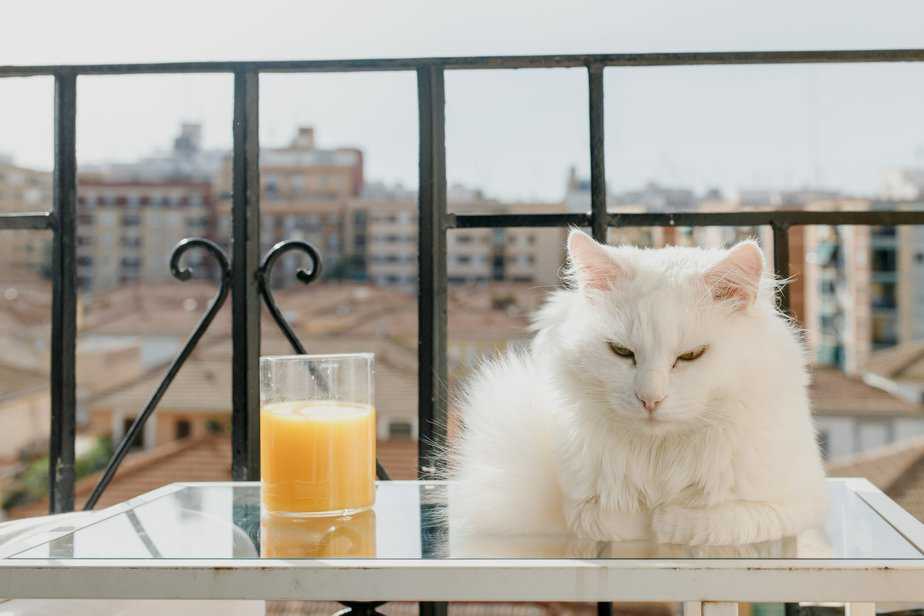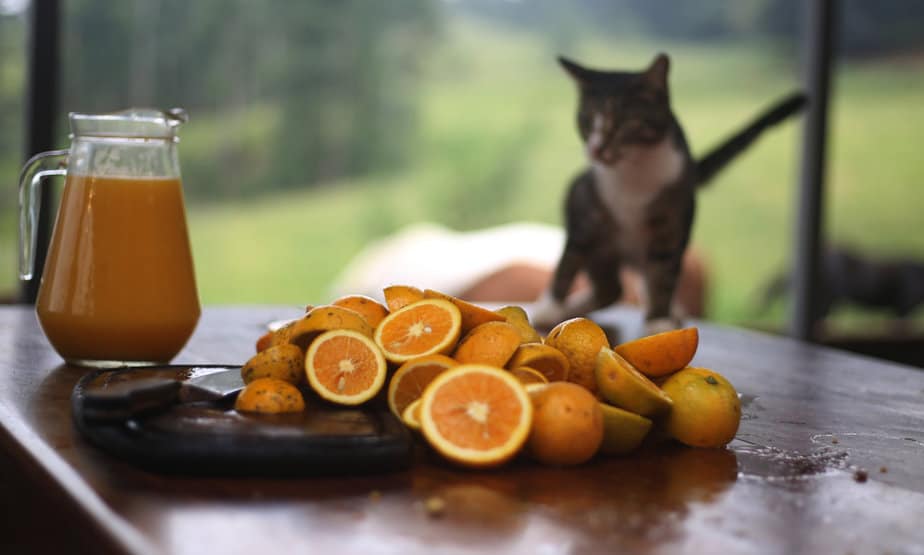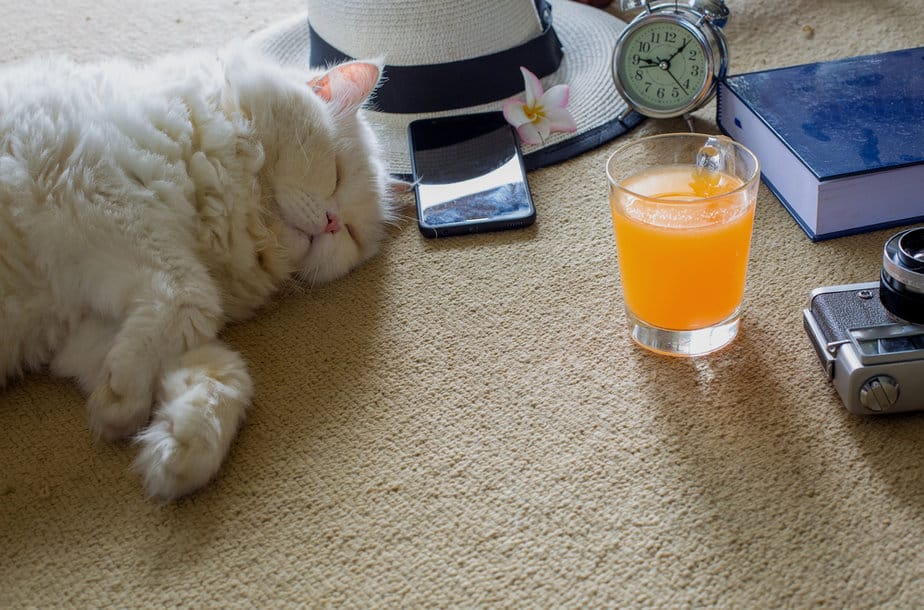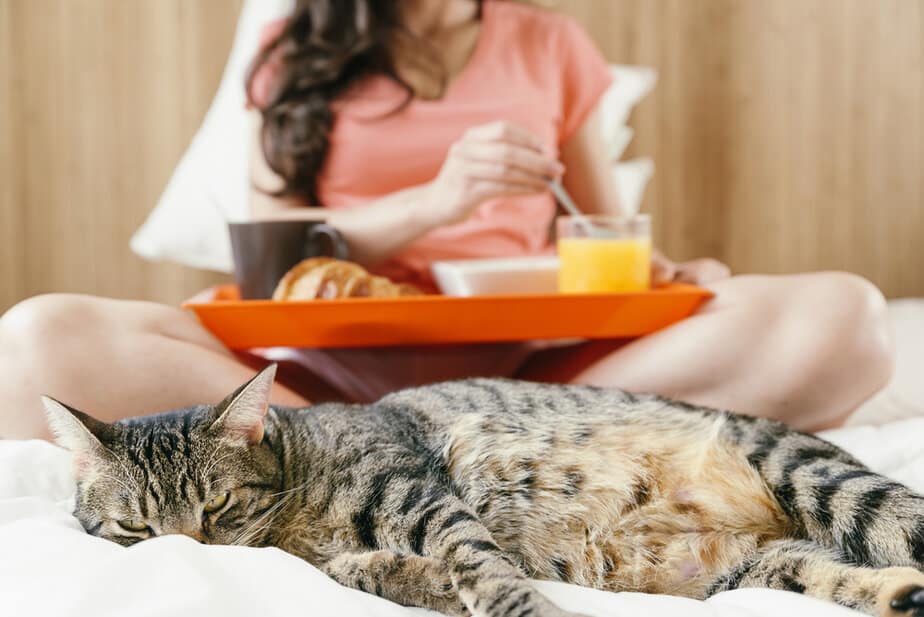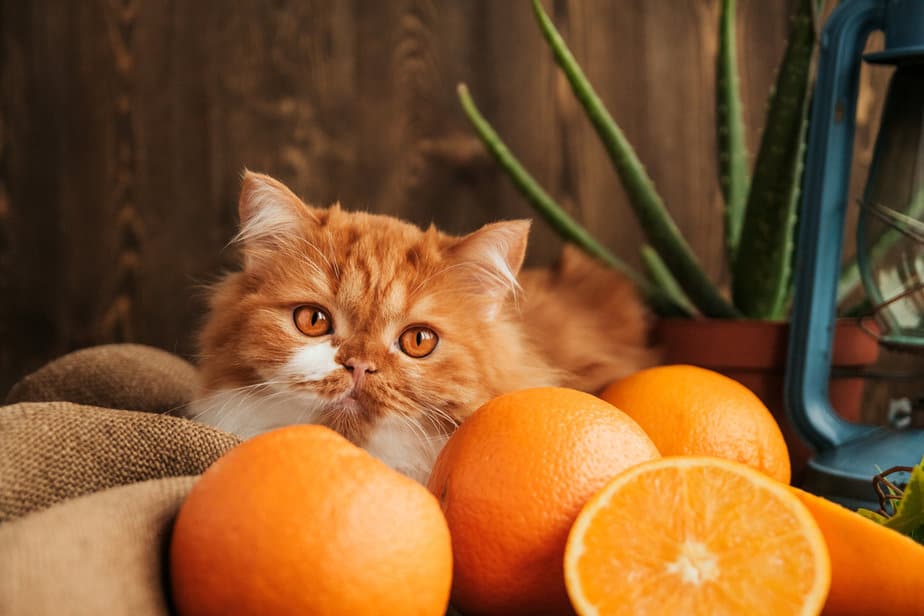📖 Table of Content:
“Can cats drink orange juice!?” Who would’ve thought you’d be looking for an answer to this question in the middle of the night?
And then again, who would’ve thought your curious creature would be sitting next to you, blissfully unaware, purring and meowing as you try to figure out whether you can surprise her with breakfast in bed? Who would’ve thought this would be your life?
Yet here you are. You were completely taken aback earlier today when you caught her throwing curious glances at your glass of orange deliciousness. She’s never been the kind of cat to show interest in anything other than her regular cat food and cat treats, so she took you by surprise.
She’s been eating and drinking the same thing for years (Cat Chow Complete and a fresh bowl of water for the win!) But she seems to be drawn to the refreshing joy of biting into a juicy orange slice or the mouth-watering sensation of taking a sip of citrus juice (you’re to blame for that!)
So, can cats drink orange juice? Our friends over at the ASPCA (American Society for the Prevention of Cruelty to Animals), deem oranges VERY poisonous to cats. And, you might have guessed this yourself, orange juice doesn’t get a passing grade either.
While super delicious, nutritious, and healthy for humans, orange juice can make your cat regret her sudden love of all things citrus. And because we want you and your mischievous monster to be safe and sound at all times, here’s everything you need to know about what makes oranges A BIG NO-NO.
What’s the deal with oranges?
“What’s orange juice made of!?” asked pretty much nobody because this popular drink hasn’t circumvented anyone. Trust me, you can find freshly squeezed or commercially available orange juice wherever you go. Makes you wonder, what makes oranges so a-peel-ing?
As a matter of fact, oranges are one of the most popular fruits out there. They’re round, orange-colored (obviously!) citrus fruits grown on trees. They originally grew only in China, but they made their way everywhere else.
Oranges are a true superfood (as TikTokers LOVE to call everything that has vitamin C) – a powerhouse of nutritional benefits and a treasure house of health benefits. They’re filled to the brim with vitamin C, vitamin A, folate, thiamine, calcium, and potassium.
One orange a day can boost your immune system, maintain the proper production of collagen, protect your cells from damage, slow down the onset of eye-related diseases, and help fight cancer-causing free radicals within your body. We’re pretty sure that an orange a day keeps the doctor away.
And, don’t even get me started on the fact that your morning glass of orange juice probably contains more than one orange. So, while we’re on the whole proverb thing, the more the merrier!
But, we can’t say that your little feline friend can reap the same benefits from drinking a glass of orange juice. Actually, felines tend to do the exact opposite most of the time.
Can cats drink orange juice?
To cut a long story short, cats cannot drink orange juice. We know you’re probably pretty disappointed right now, but you need to trust the fact that this tasty treat wasn’t meant for your furry friend.
You see, cats are carnivores. They need meat (animal-derived nutrients) in their diets in order to survive and thrive. They don’t need fruits, veggies, and whole grains in their diets the same way you do.
Actually, they don’t even possess the digestive enzymes necessary to break down and process most foods we as humans eat regularly. For example, they can’t (or at least shouldn’t) drink milk because they can’t have lactose. They can’t eat sweet things because they can’t taste them AND they can’t have sugar.
So, what does that mean when we’re talking about letting your furry friend drink orange juice? First things first, you can’t let her and that’s what you need to tell her when she gives you the look: “No, Mrs. McFluffer, you can’t drink orange juice or you’ll end up at the emergency animal clinic!” – or something like that.
Trust me, there are so many things that could go wrong on the off-chance that your cat drinks whatever’s left of your orange juice.
We say “on the off-chance” because oranges are actually cat repellents, meaning cats generally HATE the smell and the taste of citrus. So, we’re pretty sure your cat wouldn’t even want to drink it.
That’s great news because these little fruits can cause a bunch of problems to your cat – from digestive problems and heartburn to weight problems because of the sugar, and even depression because of the citric acid.
Grab a pen and paper because you might want to take notes for the following section.
What happens if your cat drinks orange juice?
Where do we even start!? Cats can’t drink orange juice because they can’t eat oranges.
Orange juice typically contains a bunch of oranges (obviously!?) and a bunch of sugar. Not to mention that orange juice contains a fair amount of compounds (psoralens, acids, oils, etc.) that can and will make your cat’s life miserable.
So, before you and your precious purrincess explore your summer mocktail pawsibilities, you might want to throw a glance at some of these lesser-known (and very bad!) orange components.
1. Psoralens
Psoralens are one of those things that are POTENTIALLY bad for humans – we’re not fully aware of what they can do, but we’re aware that they can’t do any good. And, what’s even worse, psoralens are pretty much everywhere around us because they can be found within ALL citrus fruits (yup, lemons and limes too).
Here’s what we do know. Psoralens can cause your (and your cat’s) skin to become extremely sensitive to sunlight, resulting in irritation, rash, sunburn, and even malignant melanoma. Your little furry friend might not be likely to drink that much, but it’s better to be safe than sorry.
2. Citric acid
Here’s where things get even worse for this tasty drink. Cats can’t drink orange juice because oranges contain citric acid. And, according to our friends over at the ASPCA, citric acid shouldn’t be anywhere near your feline friend’s stomach.
That’s right, citric acid is poisonous to cats. Some of the most common symptoms of citrus poisoning to keep an eye out for are drooling, weakness, depression, vomiting, and diarrhea. Make sure you also take note of skin rashes, irritations, and hives – you never know where her paws might have been.
3. Essential oils
Trust me, essential oils for cats are never a good idea. Cats don’t possess the digestive enzymes necessary to break down and process most drugs, medications, or essential oils. Consuming these things can result in an array of digestive and other health problems.
And, of course, oranges (orange peels, to be exact) contain essential oils. Orange essential oils can be used as cat repellents because cats ABSOLUTELY hate their smell – they scrunch up their noses, perhaps give them a little sniff, and run off.
That’s great because they’re not likely to munch on them, but you can never be too sure.
4. Sugar
“Sugar, no please…” aren’t those the words of that Maroon 5 song? No? Well, they certainly should be because your four-legged friend shouldn’t nibble on sugar whatsoever. And before you go “OMG, we can’t imagine our lives without sugar!” on me, sugar isn’t on ASPCA’s naughty list.
But, that’s not to say that sugar won’t send your (potentially chonky) cat to the emergency vet. Drinking orange juice (that contains AT LEAST twice as much sugar as an orange) can cause your cat problems with teeth, weight gain, obesity, and diabetes.
We’re feeling pretty alarmed; how about you!?
5. Allergies
And, of course, cats can’t drink orange juice because of the chance of experiencing an allergic reaction. That’s right, cats can be allergic to oranges and other ingredients you can find in orange juice (sweeteners, preservatives, the list goes on and on).
That’s why you should always consult with your vet before making any changes to your cat’s eating or drinking habits. You can never be completely sure whether your cat’s developed certain allergies and sensitivities over time. Give your vet a call, and voilà!
